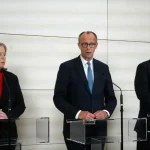In the rarefied world of African presidential families, where discretion has always been the better part of valor, 26-year-old Brenda Biya is breaking all the rules. The daughter of Cameroon’s 91-year-old President Paul Biya isn’t just enjoying the privileges of power—she’s broadcasting them to the world through meticulously curated TikTok videos featuring Rolex watches, designer outfits, and a lifestyle that would make even the most seasoned socialite blush.
But this isn’t just another story of presidential progeny living large. Brenda Biya represents something far more significant: the emergence of a new African elite that’s unapologetic about its wealth, digitally savvy, and willing to use luxury as a form of political statement. While her father presides over a nation where nearly 40% of the population lives below the poverty line, Brenda’s flashy displays of wealth have become a powerful form of silent protest against the austere, conservative image her father’s regime has maintained for over four decades.
Decoding the Luxury Statements
Brenda’s choice of luxury items speaks volumes about her rebellion:
-
The Rolex as Political Symbol: Her apparent preference for Rolex watches—particularly models like the Datejust and Daytona—is particularly significant. In African political circles, Rolex has long been the ultimate symbol of established power and longevity. By flaunting these timepieces, Brenda isn’t just showing off wealth; she’s appropriating the very symbols of the political establishment she’s subtly challenging.
-
Designer Fashion as Armor: Her wardrobe, featuring brands like Gucci, Chanel, and Balenciaga, serves as both protection and provocation. Each designer outfit functions as armor against the traditional expectations of how a presidential daughter should behave, while simultaneously provoking conversations about wealth distribution and privilege in Cameroon.
-
The Private Jet Aesthetic: Her social media posts often feature luxury travel and five-star destinations, creating what we might call the “private jet aesthetic.” This isn’t just about comfort; it’s about demonstrating a level of global mobility and freedom that stands in stark contrast to the limited opportunities available to most young Cameroonians.
The Cultural Impact of Luxury Rebellion
Brenda’s approach represents a new form of protest that’s uniquely available to what we might call the “rebel elite”:
-
Redefining African Wealth: She’s challenging the stereotype that African wealth must be discreet or apologetic. Her unapologetic display of luxury is, in its own way, a rejection of Western expectations about how African elites should comport themselves.
-
The Globalization of Elite Culture: Brenda represents a new generation of African elites who are as comfortable in Paris and Dubai as they are in Yaoundé. Her social media presence shows the emergence of a truly global African elite culture that transcends national boundaries.
-
Luxury as Political Speech: In a country where direct political criticism can be dangerous, luxury becomes a form of coded political communication. Every flash of a Rolex or designer handbag serves as a reminder of the inequality that characterizes the current system, while also demonstrating the speaker’s immunity from consequences.
The Backlash and What It Reveals
The response to Brenda’s luxury displays has been telling:
-
Traditional Media: State-controlled media has largely ignored her, following the traditional playbook of dismissing what they cannot control.
-
Social Media: Among younger Cameroonians, her posts generate both admiration and anger—admiration for her bravery, anger at the display of privilege in a struggling nation.
-
International Observers: Global luxury brands have taken note, recognizing the emergence of a new type of African consumer who sees luxury as both personal expression and political statement.
The Future of African Elite Rebellion
Brenda Biya’s story signals the emergence of a new phenomenon in African politics: the luxury rebel. These are individuals who use their privileged position and material possessions not just for personal enjoyment, but as tools of subtle resistance. They understand that in the age of social media, a Rolex can be as powerful as a protest sign, and a designer outfit can make a statement as bold as any political manifesto.
As Africa’s long-serving leaders age and their digitally-native children come of age, we’re likely to see more of these luxury rebellions. They represent not just a generational divide, but a fundamental shift in how power and privilege are performed and perceived in modern Africa. The question is no longer whether the children of Africa’s political elite will rebel, but what designer labels they’ll be wearing when they do.










